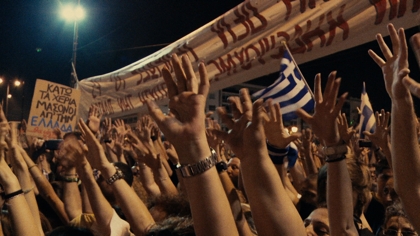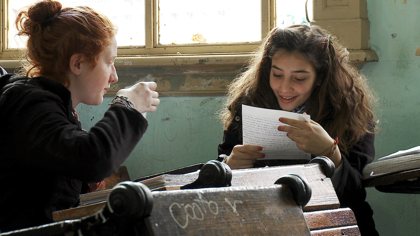Festivals
Berlinale 2012: The S&S blog
Time for outrage: Tony Gatlif’s Indignados

Demetrios Matheou, 15 February
I was very sad to hear of the violence in Athens this week, in particular the burning of the wonderful pair of city-centre cinemas, the Attikon and Apollon. Built in 1912, these are an integral part of the Athens International Film Festival, and I’ve spent many balmy evenings on the streets outside, chatting and smoking with the enthusiastic Greek audiences. The word is that the cinemas can be saved, but it’s a sorry state of affairs when louts can use the economic crisis as an excuse to destroy their own culture.
The events in Athens made me think immediately of one of the most apposite films here in Berlin, Tony Gatlif’s Indignados, which represents a more powerful and creative way to vent one’s anger.
Described as a “dramatised account of a Europe in revolt”, the film looks specifically at two things: the appalling experiences of undocumented immigrants, and the continent-wide demonstrations against the economic crisis. Gatlif derives his title from Spain’s Indignados (Outrage) protest movement, and his inspiration from the pamphlet ‘Indignez-vous!’ (‘Time for Outrage’) by the former Resistance fighter, diplomat and writer Stéphane Hessel.
The film occupies that ever-murky, ever-engaging grey zone between documentary and fiction. In its foreground is the story of ‘Betty’, a young, undocumented immigrant from Africa, who mysteriously swims ashore in Greece and is buffeted from one country to another, unwanted, her only trace on the continent the fingerprints taken by police wherever she goes. Betty’s story is clearly orchestrated; around her Gatlif combines conventional documentary coverage of the mass demonstrations in Athens and Madrid with beautifully shot and imagined sequences that add resonance to his theme.
In one, which draws on the visual tools of the Indignados protesters, a flamenco dancer performs in the heart of a deserted, graffiti-covered concrete complex while showered by a confetti of leaflets. Elsewhere, hundreds of oranges cascade downhill through rain-soaked African streets, the spring of their passage evoking the desire for freedom and expression of anyone from the participants of the Arab Spring to those escaping Africa for a supposedly better life elsewhere.
Gatlif’s use of quotations (from Hessel) and other text onscreen evokes Jean-Luc Godard’s didactic devices; but whereas the old provocateur generally gives the impression that he’s beating only to his own drum, Gatlif’s film has a communal sensibility and a warm pulse. One dramatic embellishment of his documentary image is heartbreaking: as the camera surveys an array of empty mattresses and cardboard boxes on the streets of Paris, captions inform us of the names, ages and places of origin of those who sleep upon them.
Betty’s story sometimes feels forced, but overall this is an engrossing account of the state we’re in, connecting the ‘undesirable’ newcomers to Europe with those – as in Athens – who have a passport, citizenship, who pay their taxes, but are no more loved.

Elsewhere on the documentary front, I enjoyed Celina Murga’s Escuela normal (above), which follows the day-to-day chaos of a provincial school, buckling under the weight of too few teachers and resources, and far more kids than the building can bear. Like the Argentine’s feature work (Ana and the Others and A Week Alone), this has no exposition. We’re trusted to follow the camera and make our own assessments of what it finds in classrooms, staff rooms, hallways teeming with life and the heated hustings for student council elections; and that is a microcosm of the country itself.
By contrast, Kevin Macdonald’s account of the life and times of Bob Marley, Marley, had far too many talking heads, fighting for room on a narrow hagiographic path, and the more they talked the more their subject receded into the dark. From such an imaginative documentary-maker, this was a huge disappointment.
« Two small gems from Jordan and Austria
Silver valentine: Miguel Gomes’s audacious movie medley Tabu »
See also
East London on film: Frances Morgan on local portraits at the East End Film Festival, including Michael Chanan’s Chronicle of Protest (May 2011)
Santas, waffles and echoes of turmoil: Adina Bradeanu on street theatre at the International Amsterdam Documentary Festival (December 2010)
BirdWatchers reviewed by Sophie Mayer (October 2009)
The Edge of Heaven reviewed by Catherine Wheatley (March 2008)
One deadly summit: Patrick Kennedy on a radical film project behind the lines at the Genoa anti-globalisation protests (September 2001)
Hold Back the Night reviewed by Philip Kemp (January 2000)
Lucky People Center International reviewed by Xan Brooks (November 1999)
